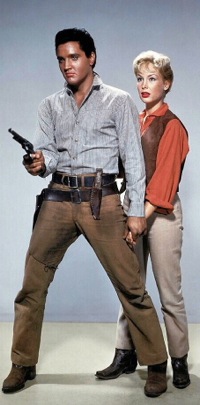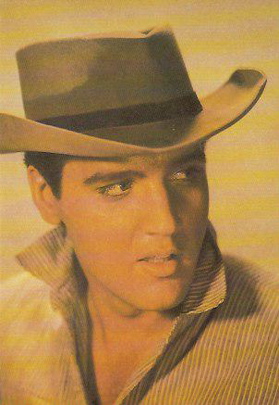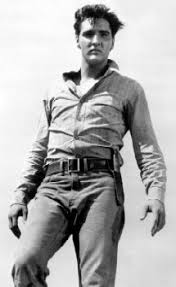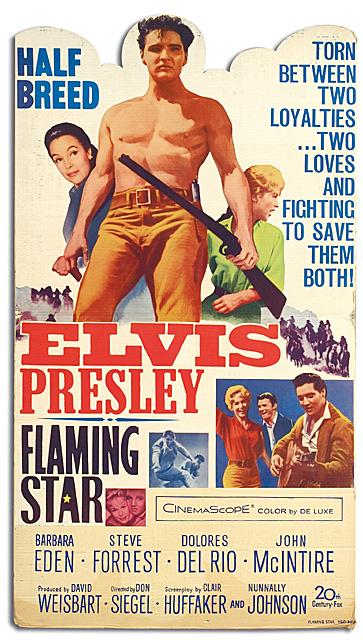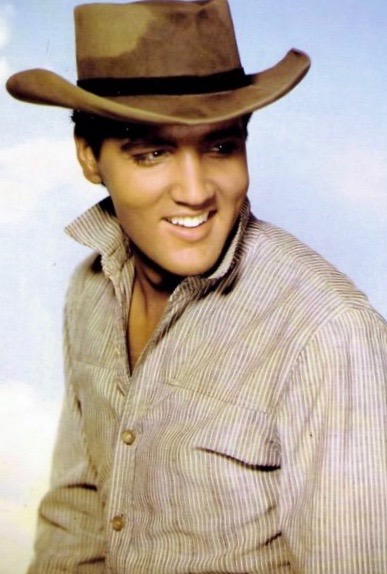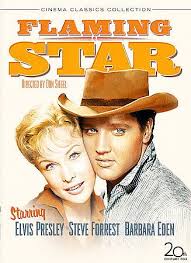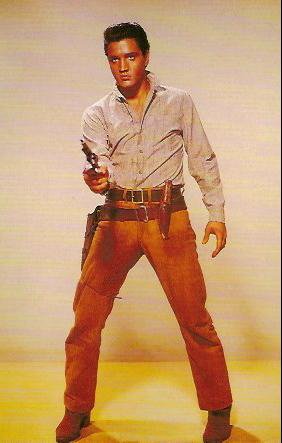Elvis History Blog
"Flaming Star" … an Elvis Record
Inspired by a Denver Bootlegger
I first heard "Flaming Star," the title tune for Elvis’ 1960 Western flick, sometime in March 1961. Once a week, on Thursdays I think, KNEW, Spokane’s Top 40 station at the time, ran a “Battle of the New Sounds” segment. The DJ would play three or four recently released records, and listeners were invited to call in and vote for their favorite. One week "Flaming Star" was one of the “New Sounds” in the competition.
Having just turned 12 years old, I was not yet an Elvis fan. (I wouldn’t experience that personal epiphany until a year and a half later.) So that particular evening I was free to assess Presley’s new tune with an unbiased ear. It sounded pretty bland to me, especially considering it followed on the heels of four Elvis blockbuster hit singles—"Stuck on You," "It’s Now or Never," "Are You Lonesome Tonight?" and "Surrender." It had a steady, ordinary rhythm. Nothing distinctive about it—no passion, no big-voice finish. When the DJ declared it the week’s top “New Sound,” according to the listener poll, I thought, “C’mon. That cowboy song?” Still, even at that young age, I understood the power of Elvis’ name. He could have recorded "Mary Had a Little Lamb" and it would have broken into the Top 10.
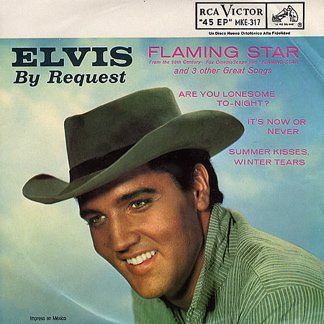
As it turns out, Presley fans were lucky that "Flaming Star" made it onto vinyl at all back in 1961. Elvis initially recorded the title song for his sixth movie on August 8, 1960, at Radio Recorders in Hollywood. When 20th Century Fox changed the movie’s name from Black Star to Flaming Star, Elvis had to return to Radio Recorders on October 7, 1960, to rerecord the title tune with the new title.
• Title tune not used to promote the movie
Certainly Fox hoped that RCA would release the song in some record format to help promote the film, which was due out during the holiday season later that year. However, RCA saw no commercial value in releasing "Flaming Star" at that time. In late 1960 "Are You Lonesome Tonight?" sat atop the Billboard “Hot 100” and his soundtrack LP G.I. Blues was riding high on the album chart. Throwing a bland tune like "Flaming Star" out on the market could only complicate things. So, when Fox released Flaming Star just before Christmas 1960, Elvis fans first heard the title song from their theater seats.
But soon after the film opened, a handful of U.S. radio stations began playing the unreleased "Flaming Star" recording over the air. It turned out that a DJ had recorded the song on a portable tape recorder in a Denver theater, transferred the recording to vinyl disc, and then broadcast it on his radio station. The “soundtrack bootleg” recording was soon playing on stations in Los Angeles and Pittsburgh.
In January 1961, both Billboard and Variety ran articles on the unauthorized use of the song. According to Billboard, “executives of the picture firm, the publishing firms and Colonel Parker were startled when they heard that three stations had played tracks from the film.” They had learned about it when radio station managers around the country began calling RCA distributors asking for the “new” Presley record that competing stations were playing.
Studio and publishing representatives gathered in New York to come up with a strategy to deal with the "Flaming Star" bootleg. The publishers sent a notice all radio stations prohibiting use of the song on the air. Fox notified all theaters showing the movie that taping sound from the film was illegal. Exhibitors were further told to call any radio station they heard playing any of the tunes from the flick and inform them of the situation.
• High demand for Elvis music led to bootlegging
“It is rare, of course,” Billboard explained, “that the track from a movie is in such demand that people will actually tape it from the film at a local cinema. But the demand for Presley recordings is so strong that some sharp characters did it. Possibly, in these days of midget tape recorders, it may be difficult to stop anyone from recording the track of a movie.”
Variety explained that “bad quality of the recording, which was done without proper acoustical treatment in the theatre, is seen hurting Presley and the pic company does not regard these air plays as necessarily positive plugs. In addition, the fact that some jockeys thought they were being brushed off by the Victor distribs also was bad public relations for Presley and the diskery.”
As for how RCA would handle the "Flaming Star" tune in the future, Variety stated that the label “does not intend to release the pic tunes since it is essentially a dramatic role for Presley with the music relatively incidental.” Billboard, on the other hand, reported that “Victor intends to bring out recordings of the songs in ‘Flaming Star,’ but not yet. Not until ‘G.I. Blues’ is no longer one of the hottest-sellers in the country.”
Billboard was right. The bootleg version convinced RCA that there was a market for "Flaming Star." However, the format and timing of the song’s release caused problems for RCA. Issuing it as a single was not an option. "Are You Lonesome Tonight?" was still near the top of the charts in January, and "Surrender" was already in the pipeline for a February single release. It was considered vinyl suicide to have two singles by the same artist competing with each other for chart space.
• "Flaming Star" included on unusual “extended play”
Not enough music had been recorded for "Flaming Star" to fill an LP. That left the “extended play” format as the only remaining option. Elvis had cut four songs for the movie, but two of them, "A Cane and a High Starched Collar" and "Britches," were hokey numbers that Elvis insisted never be released (and they weren’t until after his death). That left only "Summer Kisses, Winter Tears" available to package with the title tune. But since the single option was off the table, two more songs had to be included to make it an “extended play.” RCA threw in Elvis’ two recent single hits, "It’s Now or Never" and "Are You Lonesome Tonight?" and made the package available in its “Compact 33 Double” format in February 1961. The EP’s title, Elvis By Request, ironically seemed to acknowledge that the earlier bootleg version had created the demand that led to the RCA release.
Another irony of RCA’s "Flaming Star" release is that the same DJs who flooded the company with requests for the song, ignored it for weeks after they got their wish. "Flaming Star" got few plays while "Surrender" was riding atop the “Hot 100” in February and March 1961. It was only after that disc began moving down the chart, that "Flaming Star" started to get some spins on the airways.
• Movie title song spent seven weeks in “Hot 100”
On April 17, 1961, the tune broke into the “Hot 100” at #85. Four weeks later, on May 15, Flaming Star reached its chart peak at #14. That same week Elvis’ next single, "I Feel So Bad," entered the chart at #43. Radio stations switched over to the new Presley tune, and "Flaming Star" quickly slid off the “Hot 100” after seven weeks on the chart. In the end, radio stations used it merely as a “fix” for Elvis fans in the time void between two Presley singles.
There was at least one American disc jockey, however, who held Elvis’ recording of "Flaming Star" in very high regard. In the May 15, 1961, issue of Billboard, the following question was posed to a panel of DJs. “What is your all-time favorite record and why?” Tom Rounds of KPOI in Honolulu replied as follows:
“The record that helped raise funds for a memorial to the men entombed in the sunken battleship Arizona at Pearl Harbor has become my favorite all-time single. Col. Tom Parker sent the first acetate of ‘Flaming Star’ to KPOI in a joint venture to promote a fundraiser by Elvis Presley here. The record was an overnight success and helped provide part of the tremendous public backing still needed at the time to commemorate a tragic day in American history.”
As it turns out, then, "Flaming Star" may be Elvis Presley’s most patriotic recording. And it also turns out that "Flaming Star" has kind of grown on me since I sneered at it when I first heard it nearly 50 years ago. I have to admit that I rather like listening to it in my old age. — Alan Hanson | © September 2009
Go to Elvis Music
Go to Home Page
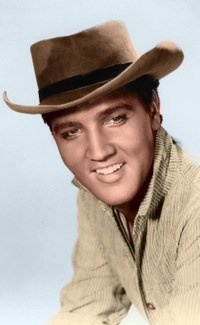
"Soon after the film opened, a handful of U.S. radio stations began playing the unreleased Flaming Star recording over the air. It turned out that a DJ had recorded the song on a portable tape recorder in a Denver theater."
